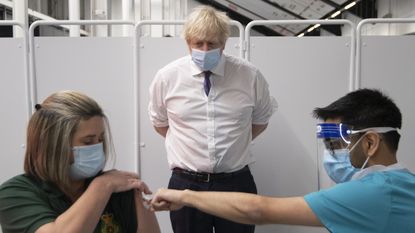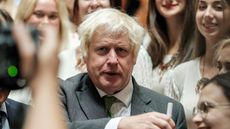What does Oxford vaccine efficacy mean for getting back to normal life?
New data shows jab may cut transmission by 67% - raising hopes of end to lockdowns

A single dose of the Oxford-AstraZeneca vaccine may have a “substantial effect” on curbing the spread of Covid-19 and provide sustained protection against the virus for at least three months, a new study has found.
Test results from the University of Oxford published in a pre-print report in The Lancet show that the first shot may reduce transmission among people who have had the jab by 67% while providing an average of 76% protection against symptomatic infections from three weeks until 90 days.
In a finding that appears to support the UK’s decision to delay second doses, the research also indicates “that spacing out the second dose by a longer period in fact further increases its efficacy”, reports Politico’s London Playbook.
Subscribe to The Week
Escape your echo chamber. Get the facts behind the news, plus analysis from multiple perspectives.

Sign up for The Week's Free Newsletters
From our morning news briefing to a weekly Good News Newsletter, get the best of The Week delivered directly to your inbox.
From our morning news briefing to a weekly Good News Newsletter, get the best of The Week delivered directly to your inbox.
Health Secretary Matt Hancock welcomed the news as “absolutely superb”, adding that the early results show that “vaccines are the way out of this pandemic”.
That verdict was echoed by Professor Robert Read, a member of the Joint Committee on Vaccination and Immunisation. As LBC’s Tom Swarbrick tweets, Read is predicting that “if the numbers are right, and we’ve vaccinated 50-year-olds, the government will be in a position to look at a smooth transition to end lockdown”.
The publication of the data has renewed calls for Boris Johnson to reopen schools at the earliest possible opportunity, with senior Tory MPs telling The Telegraph that the prime minister is facing “relentless pressure” from across the party.
Tory MP William Wragg, chair of Parliament’s public administration committee, said yesterday that with schools in Scotland set to reopen within weeks, “I’m wondering what’s holding us back from opening them up in England too”.
While the vaccine data suggests that the UK’s jab campaign is on the right track, however, the discovery of the first domestic Covid mutation has cast a shadow over the celebrations.
Hancock told the Commons yesterday that coronavirus “mutations of concern” have been found in Bristol and Liverpool. Christina Gray, director of public health for Bristol, added that “early detection of this mutated form of the virus that first appeared in Kent means we can respond swiftly to ramp up testing in the area to better understand the local situation”.
The emergence of more new strains of the coronavirus is “not a surprise”, says The Times’ science editor Tom Whipple, and “tweaked versions of the vaccine in development”.
“The good news is once we all begin to receive those, we will probably be just as safe from the variants as with the bog-standard original version,” he continues. “The bad news is that that will give evolution a niche to try something new.”
Government officials have also moved to temper expectations of a swift end to the current lockdown. Sources told Politico’s London Playbook that with the number of Covid cases per 1,000 people in England currently at 294, compared with 144 in Scotland, Downing Street will continue to take a “cautious” approach.
Create an account with the same email registered to your subscription to unlock access.
Sign up for Today's Best Articles in your inbox
A free daily email with the biggest news stories of the day – and the best features from TheWeek.com
Chas Newkey-Burden has been part of The Week Digital team for more than a decade and a journalist for 25 years, starting out on the irreverent football weekly 90 Minutes, before moving to lifestyle magazines Loaded and Attitude. He was a columnist for The Big Issue and landed a world exclusive with David Beckham that became the weekly magazine’s bestselling issue. He now writes regularly for The Guardian, The Telegraph, The Independent, Metro, FourFourTwo and the i new site. He is also the author of a number of non-fiction books.
-
 Covid four years on: have we got over the pandemic?
Covid four years on: have we got over the pandemic?Today's Big Question Brits suffering from both lockdown nostalgia and collective trauma that refuses to go away
By Chas Newkey-Burden, The Week UK Published
-
 How happy is Finland really?
How happy is Finland really?Today's Big Question Nordic nation tops global happiness survey for seventh year in a row with 'focus on contentment over joy'
By Harriet Marsden, The Week UK Published
-
 The hollow classroom
The hollow classroomOpinion Remote school let kids down. It will take much more than extra tutoring for kids to recover.
By Mark Gimein Published
-
 Excess screen time is making children only see what is in front of them
Excess screen time is making children only see what is in front of themUnder the radar The future is looking blurry. And very nearsighted.
By Devika Rao, The Week US Published
-
 Covid-19: what to know about UK's new Juno and Pirola variants
Covid-19: what to know about UK's new Juno and Pirola variantsin depth Rapidly spreading new JN.1 strain is 'yet another reminder that the pandemic is far from over'
By Arion McNicoll, The Week UK Published
-
 Does declining birth rate spell doom for Britain?
Does declining birth rate spell doom for Britain?Today's Big Question Ageing population puts pressure on welfare state, economy and fabric of society, while fertility is rising on populist agendas
By Harriet Marsden, The Week UK Published
-
 Long-term respiratory illness is here to stay
Long-term respiratory illness is here to stayThe Explainer Covid is not the only disease with a long version
By Devika Rao, The Week US Published
-
 Covid inquiry: the most important questions for Boris Johnson
Covid inquiry: the most important questions for Boris JohnsonTalking Point Former PM has faced weeks of heavy criticism from former colleagues at the public hearing
By The Week Staff Published


